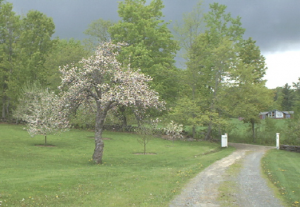Integrated Pest Management
 What is Integrated Pest Management (IPM)?
What is Integrated Pest Management (IPM)?
Diagnosis, treatment and management plan implementation by Vermont licensed technicians for ornamental and fruit trees with health issues. IPM can reduce the quantity of chemical pesticides entering the environment and can save money. IPM is based on taking preventative measures, monitoring the crop, assessing the pest damage, and choosing appropriate actions to fix the problem. Many different tactics are used in IPM, including cultural practices, biological and chemical agents, planting of pest-resistant varieties, and physical barriers to control the pest problem.
IPM is a process of consistently balancing the cultural, biological and chemical procedures to reduce the pest population on your property. Our approach to Integrated Pest Management is to incorporate many strategies to avoid or solve a pest problem. These strategies come from different disciplines, such as disease information from plant pathologists, weed information from agronomists, and insect information from entomologists. Pest can cause a lot of damage to your trees if not checked and managed. Pests are unwanted organisms that are a nuisance to man or domestic animals, and can cause injury to humans, animals, plants, structures and possessions.
Why would I need Integrated Pest Management as a service?
You might be wondering why would I need IPM. Here are some reasons for having a broader approach to pest management than just the use of chemicals.
• To keep a balanced ecosystem
Every ecosystem is made up of living things and their non-living environment, has a balance; the actions of one creature in the ecosystem usually affects the other organisms. The introduction of chemicals into the system can change this balance destroying certain species and allowing other species (sometimes pests themselves) to dominate in that environment. Beneficial insects like lady bugs that kill pests can be destroyed by chemicals leaving fewer natural mechanisms for pest control.
• Overuse of pesticides can render them ineffective
Chemicals are not always effective. Pest populations can evolve to become resistant to pesticides. In fact, some 600 cases of pests developing pesticide resistances have been documented.
• IPM is not difficult
Some of the terms and ideas may be new to you, but IPM is not difficult to put into place for your property. IPM is a sustainable practice that will maintain the natural balance of the ecosystem around your trees. IPM can save you money through avoiding crop loss (apple orchards) due to pests.
Our goal is to promote a healthy environment on your property. Through practices that promote sustainable landscapes like Integrated Pest Management we can help to preserve and protect the trees on your property and create a lifelong environment for you to enjoy.
